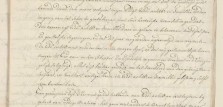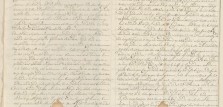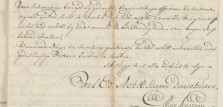On the snow ship The Unity of the Commercie Compagnie
January 1, 1762, at the roadstead of BuchananLiberiaGrand Bassa
Most honorable Sirs, directors of the Commercie Compagnie,
This letter serves to convey my best wishes to you and your distinguished family regarding the new year. May the Almighty crown you and your family with physical and spiritual blessings and may this year be followed by many more so we can live together to the honor of our creator. This until we may finally pass on to eternal bliss – all flowing from the grace of the blood of the crucified Savior in whose care I recommend your honor and family as well as myself.
I have not had the honor of writing you for quite some time now, due to a lack of necessary material. I wish this had not been the case, but unfortunately one cannot change the times. After putting out to sea with a SSE wind on the 2nd of October (I passed the Channel on the 8th), we encountered a heavy storm at north latitude 48°50’, longitude 8°39’ which lasted until October 19th when we found ourselves at North Latitude 44°31’ (a total of eleven days). For five consecutive days we only sailed with the storm jib or with completely reefed sails; the remaining six days we sailed with a reefed mainsail.
The heavy rains and high seas broke the windows and shutters of the cabin, which caused much water to enter into the captain’s cabin and constable’s room. We had to pump hard to keep the pomp dry. We also lost our starboard lower capstan.
On October 23 we passed Cabo OrtegalSpainCape Ortogaal, after which the storm started to calm down. Since then we have had good weather and sometimes even a calm – the reason for our long outward journey.
On December 7 we put down our anchor at RobertsportLiberiaCape Monte. On the coast we met captain Adriaan Sap of Vlissingen; he was in good health. He was in command of the ship The Anthonie Eeuwehout that left for Angola on December 14.
Furthermore, on the 22nd of December Captain Meijer of Amsterdam arrived here in MarshallLiberiaJunk River, sailing the frigate The Guinean Friends, also a slave ship. I have not seen any of my colleagues but am expecting them at any moment.
So far I only have eleven slaves on board, worth seven hundred seventy one guilder and five shilling in total. This is a very low number of slaves; when I was at this place on other journeys I usually collected between 25 and 30 slaves. I should leave the Windward Coast but my Windward Coast goods are detaining me. I think I will still need to spend two more months here to trade all of them. After that I will sail to the Gold Coast, and should that not go well, continue further down to Capo.
Since there are several English ships here, consisting of frigates, snows, barques and boats, trading at all the places where I go, I am forced to pay 14 to 15 guilders more per slave than the other captains and than I did on my previous journey
The price of my little powder kegs, needed here for usage, and of the blue salempouri have risen with a considerable amount in my opinion. In 1758, when the gunpowder was expensive, 6 lb. of powder kegs did not cost more than 2 ½ guilders. Currently, 100 lb. of gunpowder costs 50 guilders. This would mean that 6 lb. gunpowder would not cost more than 3 guilders, which, together with 10 shilling for the empty keg, amounts to 3 ½ guilders. However I have been charged 4 guilders and 18 s shilling. This is too much of a difference, even compared to the price of the 36 lb. powder kegs (also rather expensive).
Concerning the blue textilesalempouri: in 1754 the linen or cotton cloth, used by Africans as clothing – usually a loinclothpaantjes were expensive but the salempouri did not cost more than 17 guilders. However, I was charged 28,25 guilders when on previous journeys this was not more than 13 to 14,5 guilders. I know that when I was still in the homeland it was not sold for more 13 to 14 guilders by the compagnie and ordinary merchants. I therefore do not doubt that these are both great mistakes which resulted in the blue salempouri cargo being more than 600 guilders too much. Your honor therefore need not be amazed at the size of this cargo. I do wish I would have known of this error, or expense, when advancing the money, because I now do not know whether it caused a mistake for me. However, since this situation has increased the prices of the slaves I will have to regulate the purchase of slaves accordingly.
This is also the case since the salempouri are a part of my Windward Coast cargo; even if I could sell it for slaves at the Gold Coast I would be unable to charge more than 10 EngelsA unit of measurement for gold, 1 Ounce = 16 Engels. 8 Ounces = 1 Mark (246 grams)engelsch to the agents, since there a guilder of the homeland is not counted as one engelsch anymore.
I therefore do not doubt these are great mistakes so that only my blue salempouri cargo will be over the 600 guilders. There is therefore no need for your honor to wonder about the size of my cargo, although I would have wished to have been aware of these errors and expenses before advancing the money, since I do not know whether this is will cause errors or not. However, I need to control the acquisition of slaves
Concerning my other return cargo, it is quite pricy. Also on other ships the salempouri does not cost more than 13 to 13,5 guilders.
Furthermore I do not have anything else to tell you honorable gentlemen, except that since I left the homeland until here I have carried a corpse of one of my crewmembers on board. It is Roeloff Sieverts, born in Breeswijk in Norway. He has been ill the whole outward journey died on the 24th of December 1761 in Little BassaLiberiaLittle Bassa.
The other officers, sailors and me are, thank the Lord, still as healthy as I hope you honorable gentlemen and your families may also be. I will inform your honorable gentlemen at the next possible occasion of the circumstances of my journey.
With which it remains for me to greet you, honorable gentlemen and your families, and recommend you to God’s holy protection, I am,
Your humble servant,
Jan Menkenveld





